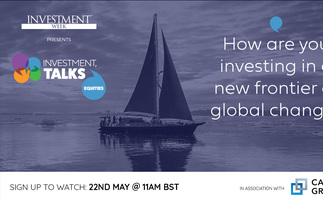With headline interest rates at record low levels in many western economies, investors are increasingly looking to high dividend-paying equities in their search for income. Traditionally such investors have tended to ‘stay at home', that is, they have only considered funds that are focused exclusively on the domestic equity market.
This no longer seems appropriate. Nowadays the UK stockmarket is home to roughly 10% of the world's companies. To be restricted to just UK-based companies therefore reduces choice and potential returns. Global equity income offers geographic diversity and more investment opportunities.

The implications of BP's recent Gulf of Mexico oil disaster highlights this issue perfectly. BP's decision to suspend dividends for the rest of the year has been a painful reminder of the problem that UK income investors face. BP's dividend payments in 2009 accounted for 12% of all dividends paid by UK companies last year. The UK market is highly concentrated with the top five dividend-paying companies expected to pay almost 40% of all dividends this year (Source: Citigroup as at 29 June 2010). As a result, diversification is difficult to achieve if investors choose to rely solely on the UK.
Screening exclusively for yield can be a dangerous strategy as a high yield is often a sign of a company in trouble or with limited growth potential. Companies that can grow their dividends in a sustainable manner over time represent much more attractive opportunities.
Dividends provide the ultimate sign of a company's financial discipline and its commitment to shareholder value. In fact, a progressive dividend policy helps a company improve. Why? A company has to grow to support a rising dividend stream. Profitable growth is difficult to achieve and many billions of dollars have been wasted in the pursuit of unrealistic growth targets.
A rising dividend stream regulates the amount of cash that can be reinvested in the firm and therefore ensures that only the most profitable projects are selected. Companies that embrace this approach to capital allocation, wherever they are in the world, have been rewarded for their financial discipline with higher share prices. Dividends are not a compromise for capital growth; dividends and share-price performance should go hand-in-hand.
So where are these companies that have shown long-term track records of consecutive dividend increases? The best examples of financial discipline are in fact found overseas. In the UK, there are just five companies with 25 year track records of consecutive dividend increases: Tesco, Halma, PZ Cussons, Royal Dutch Shell and Greggs. By contrast, the US boasts 92 such ‘dividend achievers' including household names such as Procter & Gamble, Coca-Cola and Johnson & Johnson. Procter & Gamble tops this elite group of companies with 56 years of uninterrupted dividend growth.
These ‘dividend achievers' have significantly outperformed the market. During the last decade when the return from US equities was negative overall (the S&P 500 fell 29% in capital terms and the total return, including dividends, was down 14%), the average return from the US dividend achievers was positive in terms of capital appreciation - not just positive, they have risen by 90%. On top of this substantial capital gain, investors also benefited from a rising dividend stream which, accumulated over 10 years, lifted the total return to more than 145%. In what was known as a ‘lost decade' for equities, US dividend achievers created great wealth for their shareholders. Discipline and patience can be very rewarding.
History also shows that dividends, the combination of yield and dividend growth, provide the dominant element of total shareholder return over time, not capital gains. This phenomenon is true globally. Some of the best opportunities for stock-picking among companies with progressive dividends are found not just in the US, but also in countries further afield such as Australia and Brazil. These two markets are particularly interesting because the tax and legal systems of these countries
are favourable towards investors seeking dividends. A truly global approach pays dividends. In my view the key is to identify companies that have the potential to deliver sustained long-term dividend growth. Investing in companies on this basis has the ability to add substantial value for investors especially when it is carried out on a global basis.
For Financial Advisers only. Not for onward distribution. No other persons should rely on any information contained within this article. Source of company stats in US: Mergent's Dividend Achievers as at 31.05.10, UK: Evolution Securities, company reports as at 30.06.10. Excludes Investment Trusts. This Financial Promotion is issued by M&G Securities Limited which is authorised and regulated by the Financial Services Authority and provides investment products. The registered office is Laurence Pountney Hill, London EC4R 0HH. Registered in England No. 90776.












